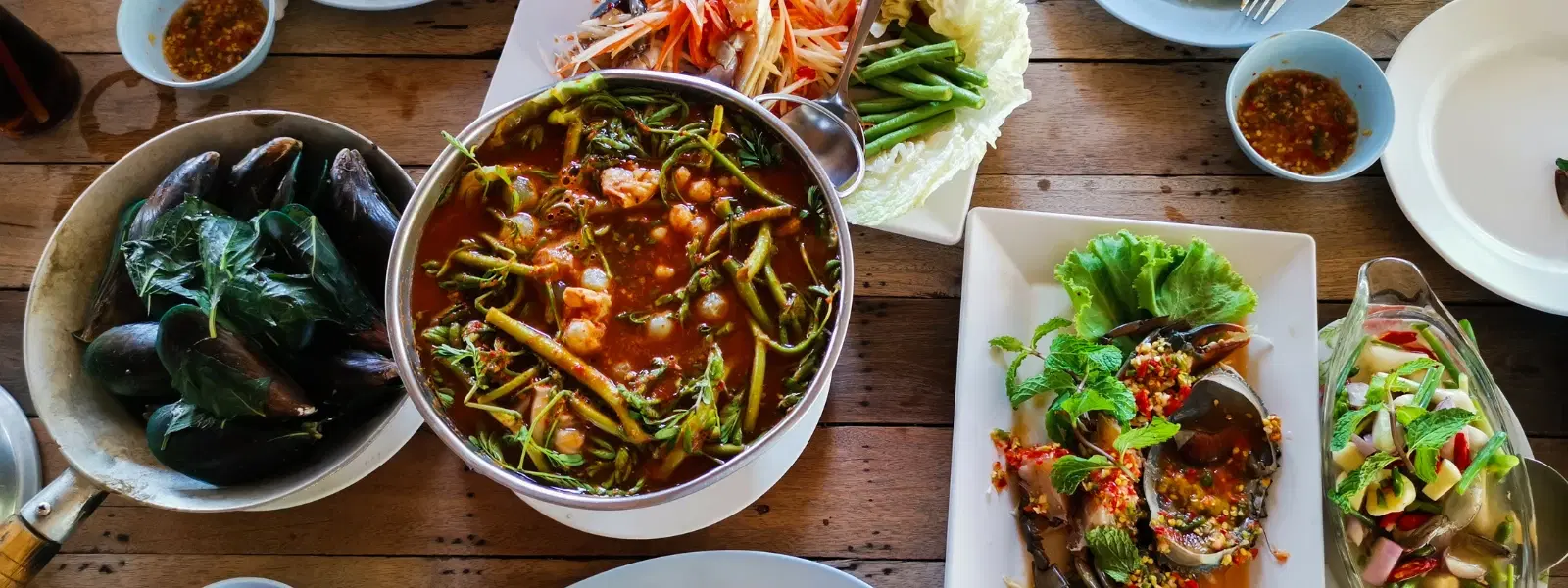
Hotels
•04 min read

Egypt's culinary landscape is a vibrant tapestry of history, tradition, and innovation. The rich flavors of Egyptian food have not only shaped Middle Eastern cuisine but also captured the hearts of food lovers around the world, including many in India. This blog post explores the fascinating world of Egyptian food by answering frequently asked questions about its origins, popular dishes, and unique flavor profiles. Readers will embark on a journey to uncover the secrets behind traditional Egyptian cuisine, street food delights, decadent desserts, and vegetarian favorites.
Egyptian food is steeped in history, drawing on influences from ancient Egyptian rituals, Greco-Roman innovations, and the flavorful traditions of Islamic cuisine. Ancient staples like bread, beans, and even beer formed the basis of early diets and have evolved into the modern dishes we savor today. The evolution of ingredients, cooking techniques, and cultural exchanges over millennia has created a culinary style that is both timeless and exciting.
The heart of Egyptian cuisine lies in its authentic flavors. Egyptian spices and herbs, including cumin, coriander, dill, and sometimes even mint, contribute to bold and aromatic dishes. The simplicity in preparation allows the natural taste of fresh ingredients to shine. This cooking approach is mirrored in the way food is served in India, where spices bring out the best in every ingredient. Each meal becomes an unforgettable experience.
Egyptian food boasts an array of dishes that are both comforting and deeply symbolic. Iconic dishes such as Ful Medames and Koshari are staples that many consider a culinary must-have. Ful Medames, rich in protein and heartiness, is a perfect example of how a simple ingredient like fava beans can be transformed into a meal of national pride. Meanwhile, Koshari—a delightful mix of lentils, rice, pasta, and a tangy tomato sauce—represents the fusion of various culinary influences and is commonly enjoyed during family meals and gatherings.
The bustling streets of Egypt are lined with vendors serving up an impressive array of street food classics. Dishes like Taamiya (Egyptian falafel), succulent Shawarma, and the spicy Hawawshi offer a glimpse into everyday Egyptian life. Street food in Egypt is not only affordable but also incredibly flavorful, much like the vibrant street snacks found in cities across India. This accessibility makes it easy for both locals and tourists to indulge in authentic Egyptian recipes without breaking the bank.

No exploration of Egyptian food would be complete without a taste of its sweet side. Traditional desserts like Basbousa, Umm Ali, Baklava, and Kunafa are rich, aromatic, and sweetly satisfying. These desserts typically incorporate ingredients such as nuts, honey, and semolina, which provide a delightful contrast to the savory dishes. The indulgence of these sweet treats resonates well with Indian palates, known for their love of sweets, and is often enjoyed during special occasions and festive celebrations.
Egyptian cuisine offers a variety of plant-based dishes that are not only nutritious but also bursting with flavor. Dishes like Besarah, which is a rich fava bean dip, and Mahshi, featuring vegetables stuffed with a herby rice mixture, are excellent options for vegetarians. Additionally, the much-loved Falafel—often made using the same methods as Taamiya—demonstrates the versatility of legumes and fresh vegetables in creating fulfilling, meatless meals. The heavy reliance on herbs, legumes, and vegetables positions Egyptian cuisine as one of the most vegetarian-friendly among Middle Eastern foods.
Traditional cooking methods in Egypt emphasize the natural flavors of plant-based ingredients. This approach, honed over centuries, ensures that dishes are both nutritious and delicious. Many Egyptian vegetarian dishes are a result of improvisation using locally available ingredients, creating a rich menu that caters to diverse dietary preferences.
Did you know that Egyptian cuisine has been plant-based for centuries due to its reliance on legumes like fava beans and lentils? This makes it one of the most vegetarian-friendly Middle Eastern cuisines!
Food in Egypt is much more than just sustenance—it is the soul of every celebration. Whether during Ramadan, where communal meals break the fast, at weddings featuring lavish spreads, or at family gatherings celebrating life, food plays an integral role in Egyptian culture. Every dish carries a story of tradition, celebration, and community. Much like the lively culinary festivals in India, these celebrations remind us that meals are best enjoyed when shared with loved ones.

In Egyptian dining, hospitality is paramount. Meals are typically communal, with family and friends gathering around a shared table. It is common to use flatbread as a utensil, enhancing the tactile pleasure of eating while also underscoring the cultural practices of sharing food. This warm, inclusive dining etiquette resonates with many Indian traditions where food is a celebration of unity and togetherness.
Ful Medames and Koshari are among Egypt's most popular dishes, enjoyed by locals and tourists alike.
Ful Medames is considered the national dish of Egypt, made from fava beans, olive oil, and spices.
Ancient Egyptians primarily ate bread, beer, lentils, and vegetables, which laid the foundation for many modern Egyptian dishes.
Ancient Egyptian foods include barley bread, beer, lentils, chickpeas, onions, garlic, dates, figs, honey, and fish.
Vegetarian-friendly dishes include Besarah, Mahshi, Falafel, and Koshari.
Egyptian food is a unique blend of ancient traditions and modern culinary techniques, offering a rich array of flavors and dishes that cater to every taste—from savory street food to indulgent desserts. Each meal is a reflection of Egypt's storied history and its ability to integrate diverse influences into a harmonious culinary style. This exploration not only highlights the delicious offerings of traditional and vegetarian Egyptian food but also underscores the cultural importance of food as a unifying element. Whether you are a wanderer, a planner, a professional, or a luxury seeker, the journey into Egyptian food is a vibrant and enriching experience that transcends borders.